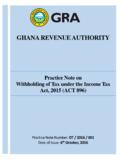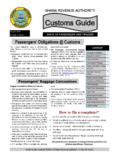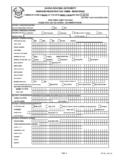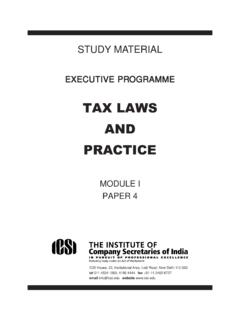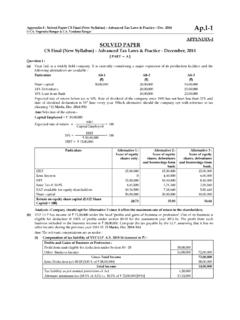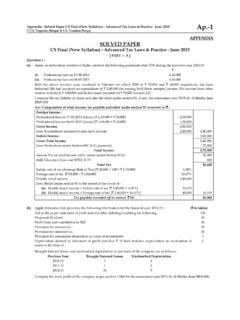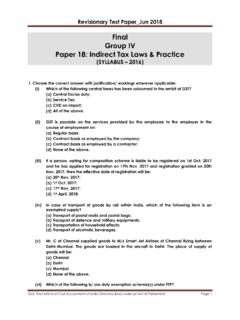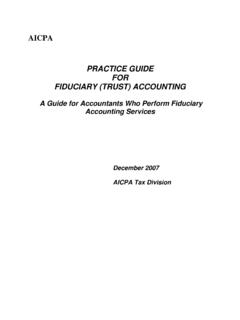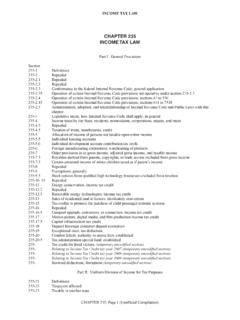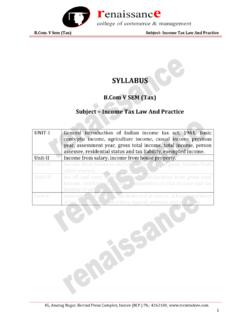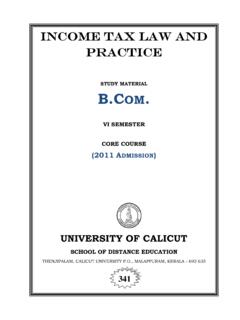Transcription of frequently asked questions New - GRA
1 1 frequently asked questions DOMESTIC TAX REVENUE DIVISION (INCOME TAX) This frequently asked questions (FAQ) booklet is to inform and educate you the taxpayer on general information about direct or income tax issues. This FAQ booklet cannot be used as a substitute for ACT 592 or any other relevant law. You need to always refer to the Act and other relevant laws for guidance and compliance as issues addressed in this booklet may change. Q1 What other taxes are administered by the IRS? In addition to income tax, the IRS administers Stamp Duty, Capital Gains Tax, Gift Tax and Mineral Royalties. 2 SECTION A PAY AS YOU EARN (PAYE) Q2 What is PAYE ? Pay As You Earn (PAYE) is the routine deduction of tax from emoluments of employees by their employers, each time employees are paid. Q3 What are the employees income tax rates? The current employee s tax rates are: Annual Tax Rates Effective June 2010 Chargeable Income GH Rate % Tax GH Cumulative Chargeable Income GH Cumulative Tax GH First 1,008 Free Nil 1,008 Nil Next 240 5 12 1,24812 Next 720 10 72 1,96884 Next 14,232 2, ,2002, Monthly Tax Rates Chargeable Income GH Rate % TaxGH Cumulative Chargeable Income GH Cumulative Tax GH First 84 Nil Nil 84 Nil Next 20 5 1 1041 Next 60 10 6 1647 Next 1,186 , Q4 Are there any allowances which are not subject to Tax?
2 3 All allowances are subject to tax except the following: - A reimbursement or discharge of a person s dental, medical or health insurance expenses where the benefit is available to all full-time employees on equal terms - A passage to or from Ghana in respect of the appointment and termination of employment of an employee who - Is recruited or engaged outside Ghana - Is in Ghana for a purpose of serving the employer - Is not a resident of Ghana Q5 How can I compute PAYE ? i Deduct Social Security from basic salary ii. Add all allowances after the Social Security deduction iii Deduct applicable personal tax relief(s) iv Use the appropriate tax table to compute the tax on the remainder( Chargeable income.) Q6. What is the tax treatment of Bonus? Bonus up to GH 1,620 per annum is taxed at 5%. Anything in excess is added to t he salary and taxed at the normal rate.
3 Q7 Are employees entitled to relief? Yes, An employee can apply for personal tax relief(s) to the IRS through his primary employer by completing a Tax Relief Application Form Q8 Is an employee obliged to file a Tax Return? The Employer files a Return of Income on behalf of the Employee. However, the Commissioner can by regulation request an employee to furnish a Return of Income if 4the employee has other sources of income rent, part-time job or other business income. Additionally, all employees who have more than one employment income are required to file a return at the end of the year. Q9 Do you have to keep Records? Yes, record keeping is incumbent on all Employers and employees with other sources of income. Q10 Taxpayers Rights - Right to Help and Information - Right to Courtesy and Consideration - Fairness and Transparency - Independent Appeal and Review - Right to claim refund of ascertained taxes overpaid - Right to claim all personal reliefs upon the satisfaction of all laid down conditions - Privacy and Confidentiality B.
4 TAXPAYER REGISTRATION AND IDENTIFICATION NUMBER Q1 What is taxpayer registration? It is the formal registration of the business at the Registrar-General s Department and thereafter at the Tax Office. Q2 Who is required to register? Any person who carries on any business is required to register with the Commissioner. Q3 Is the registration compulsory? 5 Yes. The registration at the Registrar-General s is compulsory for all companies and partnerships but optional for sole-proprietors. However, all businesses including sole-proprietors must register with the tax authorities. Q4. How do I register a business? - The first step in registering a business is to apply to the Registrar-General s Department with the following details: Name of business/company Name of the owner(for sole-proprietorship) Name of partners(for partnership) Nature of the business Location and address of the business Date of commencement of the business Q5.
5 Why must a business register with the Domestic Tax Revenue Division (DTRD) after the registration at the Registrar-General s? - Registration with the IRS is a requirement under the Internal Revenue (Registration of Business) Act,2005 (Act 684) which states A person shall not carry on any business unless that person has registered the business with the Commissioner and paid the registration fees as specified. This is a one- time registration in the life of the business. Q6. What are the specified fees? 6 CATEGORIES REGISTRATION FEES GH (Lawyers, Dentists, Engineers, Accountants, Pharmacists, Valuers, Architects and Analogous Professionals) persons other than professionals self-employed persons Q7.
6 What do I require to register with the IRS? A. SOLE-PROPRIETOR -Business Registration Certificate -Registrar-General s Form A B. PARTNERSHIP -Partnership Agreement -Certificate of incorporation of partnership -Registrar-General s Application Form (for Manufacturing Concerns) C Limited Liability Company 7 -Certificate of Incorporation - Certificate to commence Business -Company s Regulation -Manufacturing Certificate (for Manufacturing Concerns) -Vending Agreement (if company was purchased) Q8. What is Taxpayer Registration Number (TIN) This is a unique computer generated number given to taxpayers for official transactions e g. a. To clear any goods in commercial quantities from any port or factory b.
7 To register any title to land, interest in land or document affecting land c. To obtain a Tax Clearance Certificate from IRS, CEPS, or VAT Service d. To receive payment from the Controller and Accountant General or a District Assembly in respect of a contract for the supply of any goods or provision of any service. Q9. Who is required to register for TIN? Any person subject to the payment of any type of tax, filing a Tax Return or filing any document at the Registrar- General s Department or making transactions with the Accountant General s or any Ministry, Metropolitan or District Assembly SECTION C 8 ASSESSMENT Q1. What is an Assessment? - An assessment of tax is a notice of tax liability computed on that taxpayer s annual income/profit. The assessment states the following: - The estimated chargeable income - The estimated tax payable - The amount of tax and time to pay the quarterly installment.
8 - The time, place and manner of objection to the assessment Q2 What Is Self-Assessment? - Self-assessment is the system whereby the taxpayer takes responsibility to determine his own tax liability which is payable at the end of each quarter. He computes and calculates the tax based on his turnover/profits and then remits the tax due. Q3 What is a due date under the tax law? - It is the date by which Returns are submitted or when the tax due is payable according to the provisions of the income tax law. Q4 What is the due date for the filing of Tax Return? The due date for the filing of a Tax Return depends on the type of Tax Returns. However, for a Return of Income the due date is 30th April of every year for all sole-proprietors, Partnerships and other individuals. Most companies also file their Return of Income on 30th April every year.
9 *Companies with own accounting dates have four (4) months after the end of their basis period to file a Return of Income. 9 *Due date for the filing of Tax Returns on Payment of Withholding Taxes is the 15th day of the following month. Q5 What are the due dates for payment of Taxes? Companies and Self-Employed persons are required to pay their taxes in four equal installments by the end of every quarter 31st March, 30th June, 30th September and 31st December of every year. Q6. Do I need to pay my taxes even where I dispute the amount of tax? Yes. The law provides that 30% of the amount payable as contained in the notice of assessment must be paid. This ensures that no arrears are accumulated. Q7. What do I do in a situation where the Tax Assessment has not been received in a particular year?
10 You pay the previous year s quarterly assessment in order to avoid penalties. SECTION D WITHHOLDING TAXES Q1 What is withholding tax? This is an amount of tax withheld by the party making a payment to another. The amount withheld must be paid to the DTRD by the 15th day of the following month. Q2 What types of Withholding Taxes are available in Ghana? a. withholding tax from employment income (PAYE) 10b. withholding tax from payment for goods and services c. withholding tax from payment of dividends to resident shareholders d. withholding tax from payment of interest to a resident company ie banks and other financial institutions e. withholding tax from payment to non-resident persons f. withholding tax from fees to a resident part-time teacher, lecturer, examiner, examinations invigilator or supervisor g. withholding tax on management and technical services fees h.

